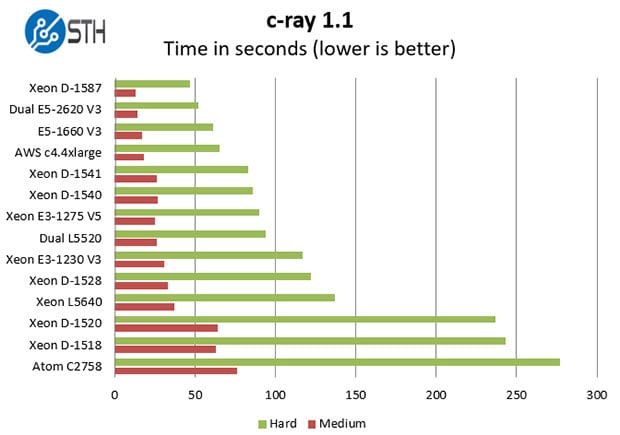16-Core, 32-Thread Intel Xeon D-1587 Benchmarks Reveal Highly Efficient Server SoC
When we think of SoCs, we typically think of smartphones, tablets and other low-power devices; but how well are they suited for servers? Well, as it happens, an SoC can deliver a huge punch when working on certain workloads, as Serve the Home found out after putting Intel's Xeon D-1587 through the paces.

The D-1587 was shipped this quarter and can be found only as an embedded option. In this particular case, the test platform included Supermicro's X10SDV-7TP8F, which supports up to 128GB of ECC memory, and includes 4x M.2 slots (supporting up to 22110 sizes), dual 10GbE Ethernet, six 1GbE Ethernet, and 4 SATA ports provided by the SoC. This board comes in a "Flex ATX" format, with a size of 9.0" x 7.25".
To help emphasize what this modest chip is capable of, it was compared to a dual E5-2620 V3 configuration. That chip was released in the fall of 2014; it's clocked at 2.4GHz (3.2GHz Turbo) and offers 12 threads. That means that the D-1587 has an advantage in thread count, but not in clock speed. It seems like a bit of an odd comparison nonetheless, but as it turns out, it's a great one: the D-1587 proves itself to be a mighty contender, as these sample results highlight:

Overall, almost all of the tests put the D-1587 in the lead amongst a collection of lower-end options. A notable exception to that comes by way of the Hardinfo CPU Cryptohash test, which booted the chip out of first to settle in at fourth place. Ultimately, one miss in one benchmark amounts to little problem for this "little" chip, and consider this: The D-1587 is 65W, while dual E5-2620 V3 chips combine for 170W. That's beyond impressive.
There is one thing we'll warn you about, though: The D-1587-equipped Supermicro X10SDV-7TP8F retails for over $2,000, so this small-but-huge performance isn't going to come cheap.

